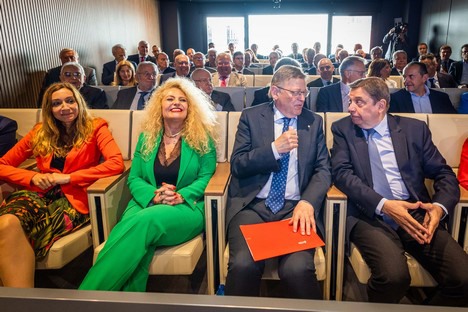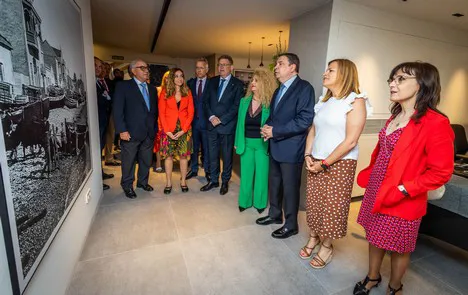The Citrus Management Committee (CGC) -the association that brings together private companies, business groups and producer organizations- has recently commemorated having been at the "service of exports and Spanish citrus exporters" for half a century. This is what its president, Inmaculada Sanfeliu, said during the ceremony organized on the occasion of the anniversary at the organization's recently refurbished headquarters in Valencia.

The event was attended by the President of the Region of Valencia, Ximo Puig, the Spanish Minister of Agriculture, Luis Planas, the Valencian Councilor of Agriculture, Isaura Navarro, and the Government delegate in Valencia, Pilar Bernabé. Today, this group of entrepreneurs accounts for 75% of the citrus fruits harvested, packaged and marketed in Spain, generating a seasonal turnover of over 2,700 million Euro. Under the harvester-exporter model, these operators bring together more than 50,000 hectares.
"The good work of the CGC members and their chameleon-like ability to adapt and evolve and to improve the customer service are largely responsible for the leadership we hold in terms of marketing; for the fact that one in four fresh citrus sold in the world have Spain as origin," said Sanfeliu.
For his part, the head of the Valencian Government, Ximo Puig, highlighted the importance of the citrus sector for the Region and for the whole country, as well as the "unity between the Government and the representatives of the producing and marketing sector in such relevant initiatives such as the implementation of cold treatment for oranges from South Africa or, more recently, the consensus reached at Valencian level to implement the new Integral Citrus Plan."
For his part, the Spanish Minister of Agriculture, Luis Planas, pointed to "the pioneering nature of the Committee as a key instrument at the service of the citrus sector, which at the time facilitated the preparations for the country's integration into the EU. And this, over time, has made it possible to expand and consolidate in new export markets."
The CGC was created by Decree 2059/1972, of July 21. That first organization brought together the whole sector, including representatives of the exporters of both private and cooperative trade, of the producers and of the juice processing industry, as well as the Ministries of Trade and Agriculture. "In Europe, there were some concerns with Spain because of the distorting effects that our lower production and labor costs could have. We were working in a market, the European market, marked by reference prices and by the so-called compensatory rates, which required coordinating and adjusting exports both quantitatively and qualitatively," said the president of the CGC.
The entry into the EEC in 1986 entailed the exit of the Administration. The signing of the Treaty on European Union (TEU) in December 1991 marked the sector's definitive emergence. Indeed, at the end of the 1960's, Spain barely reached 750,000 tons of citrus exported, but this was already one of the main sources of foreign currency; by the end of the 1970's - therefore, eight years after the CGC was created - this figure had more than doubled to over 1.5 million tons.

"We were/are a sector with a pro-European vocation, far ahead even of that of the country itself," said Sanfeliu. The entry into the then EEC and the consolidation of the EU project, the introduction of the single currency and the expansion in Eastern Europe gave the biggest boost. When Spain joined this 'club' it had a production of 3.5 million tons; today, this figure ranges between 7 and 8 million tons, with occasional dips to 6 million tons, like the one we had this season. In the season when Spain became a member of the EEC, exports did not even reach 2 million MT, but in the last 12 campaigns this figure has never fallen below 3.6 million and in 2014/15 a record of 4.1 million MT was achieved.
"The CGC is a great mediator. We are transversal and vertical employers; one of the most representative worldwide when it comes to fresh citrus marketing and production. We negotiate the harvesting and handling agreements in the Region of Valencia, but we are also producers -the largest in Spain-, with more than 50,000 hectares linked to this business group. We act as a lobby, but our goal is not to make the entity grow, but to ensure that our partners can retain their leading position and develop normally," she said.
Sanfeliu did not hesitate to point out the main obstacle to achieving this: the lack of reciprocity. "We need to compete in Europe under the same conditions as the products imported from third countries, which must be required to comply with the same labor, environmental, social and food safety standards that we enforce," she said. In his later intervention, the minister Planas was said to fully "agree with the need of fair competition" in the EU.
Lastly, the president of the CGC took the opportunity to highlight two key issues for the sector. Firstly, she thanked the Minister and the President of the Regional Government for the "hard technical and political work" carried out to ensure that the EU would make cold treatment compulsory for orange imports from countries affected by the false coddling moth. Achieving it -she recalled- "was a great milestone; a paradigm shift in plant health. Now we need the decision to be implemented effectively and in accordance with the regulations, and for compliance to be monitored.
Secondly, she warned about the difficulties that lie ahead due to the drought. "We cannot let the trees die because of a few bad years of severe water deficit. We need the commitment and involvement of the Administration to remain a driving force for the Spanish economy."
 Para más información:
Para más información:
CGC
[email protected]
www.citricos.org
